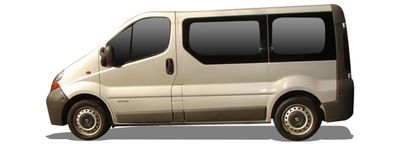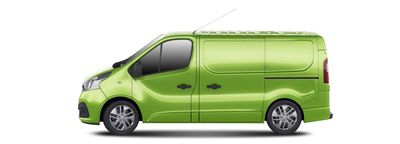Table of Contents
Renault Trafic engines
Since its launch in 1981, Renault Trafic has established itself as one of Europe's most versatile vans, offering a wide range of Renault Trafic engines across four generations. The technological evolution of Renault Trafic engines reflects the change from simple gasoline engines to modern, efficient diesel units.

Renault Trafic engines: Historic generations I-II (1981-2001)

The first two Renault Trafic generations shaped two decades of van history and were characterized by robust but still technically simple engines. Generation I (1981-1989) and Generation II (1989-2001) shared similar engine concepts, with mileage depending heavily on maintenance requirements. Well-maintained Renault Trafic engines of this era reached 250,000 to 350,000 kilometers, while neglected examples often showed major damage after just 150,000 kilometers. The absolute top engine of these historic generations was the 2.5 D with 80 hp from the second generation - an indestructible diesel engine without turbocharger, which impressed with its simplicity and reliability. The early Renault Trafic engines were not yet optimized for comfort or efficiency, but were designed for pure robustness for tough everyday van use.
Renault Trafic gasoline engines: Historic generations I-II (1981-2001)
The Renault Trafic petrol engine range of the first generation mainly comprised the 1.4-liter engine with 60 hp and later the more powerful 1.6-liter with 70 hp. In the second generation, the 2.0-liter with 90 hp and the 2.2-liter with 110 hp were added. These Renault Trafic engines were technically simple, but often underpowered for heavy loads. The 2.2-liter petrol engine of the second generation developed into the best petrol engine of this era, but suffered from high fuel consumption of 12-15 liters per 100 km. Typical problems were carburetor problems, ignition weaknesses and, at higher mileages, valve seat problems.
Renault Trafic diesel engines: Historical generations I-II (1981-2001)
The first generation of Renault Trafic diesels was dominated by the 2.0 D with 65 hp, a naturally aspirated diesel without turbocharger. The second generation brought the legendary 2.5 D with 80 hp, which proved to be the most reliable engine of both generations. Later, turbodiesel variants with 2.1 TD (88 hp) and 2.5 TD (95 hp) were added. The Renault Trafic 2.5 D without turbocharger was considered virtually indestructible - these engines often ran for over 400,000 kilometers without major repairs. The turbodiesel variants offered more power, but were more susceptible to turbocharger damage and injection pump problems.
| Renault Trafic engine | Power output | Fuel consumption | Typical weaknesses | Rating |
|---|---|---|---|---|
| 1.4/1.6 petrol engine | 60-70 HP | 10-12 l/100km | Carburetor, ignition | Average |
| 2.0/2.2 petrol engine | 90-110 HP | 12-15 l/100km | High consumption, valve seats | Moderate |
| 2,0 D | 65 HP | 8-9 l/100km | Loud, little power | Good |
| 2,5 D | 80 HP | 7-8 l/100km | Almost indestructible | Very good |
| 2.1/2.5 TD | 88-95 HP | 8-10 l/100km | Turbocharger, injection pump | Good |

Renault Trafic engines: Generation III (2001-2014)

The third Renault Trafic generation marked the transition to modernity and offered contemporary diesel technology with common-rail injection for the first time. Mileage increased significantly: Well-maintained Renault Trafic engines of this generation regularly reached 300,000 to 450,000 kilometers, with the later dCi engines from 2006 onwards being considered particularly durable. Major repairs were usually only due after 200,000 to 250,000 kilometers, mainly on the turbocharger and injection system. The absolute highlight was the 2.5 dCi with 145 hp - a powerful and reliable engine that pulled even heavy trailers with ease. This generation definitively established Renault as the diesel specialist in the van segment and for the first time also offered comfort and driving culture at passenger car level.
Renault Trafic petrol engines: Generation III (2001-2014)
The Renault Trafic petrol engine range shrank considerably in the third generation, as diesel dominated the van segment. The 2.0-liter petrol engine with 115 hp was mainly available, but was rarely chosen due to its high fuel consumption of 11-13 liters per 100 km. This Renault Trafic engine was technically sound, but unsuitable for everyday van use. Most customers opted for the much more economical and powerful diesel versions.
Renault Trafic diesel engines: Generation III (2001-2014)
The Renault Trafic diesel range initially comprised the tried-and-tested 1.9 dCi with 80 and 100 hp and the 2.5 dCi with 115 hp. From 2006, the range was extended to include the 2.0 dCi with 90 and 115 hp and the more powerful 2.5 dCi with 145 hp. All Renault Trafic dCi engines featured modern common-rail injection and turbocharging. The 2.5 dCi with 145 hp developed into the top engine of this generation - it offered excellent power delivery, was economical with 7-8 liters consumption and proved to be very reliable. Typical weak points were turbocharger problems after 200,000 km and occasional injector nozzle faults.
| Renault Trafic engine | Power output | Fuel consumption | Typical weaknesses | Rating |
|---|---|---|---|---|
| 2.0 petrol engine | 115 HP | 11-13 l/100km | High fuel consumption | Moderate |
| 1.9 dCi | 80-100 HP | 6.5-7.5 l/100km | Turbocharger after 200,000 km | Good |
| 2.0 dCi | 90-115 HP | 6.8-7.8 l/100km | Injector nozzles | Good |
| 2.5 dCi | 115-145 HP | 7.0-8.0 l/100km | Very reliable (145 hp) | Very good |

Renault Trafic engines: Generation IV (2014-today)
The current Renault Trafic generation relies entirely on modern diesel technology and represents the pinnacle of Renault Trafic engine development. All engines are based on the proven dCi technology with SCR exhaust gas purification and can easily reach 400,000 to 500,000 kilometers with proper maintenance. The maintenance intervals have been extended to 30,000 kilometers, and major engine damage has become extremely rare with proper maintenance. The absolute top-of-the-range engine is the 2.0 dCi with 170 hp - a technical masterpiece that perfectly combines power, efficiency and reliability. For the first time, this generation also offers an electric drive (E-Tech since 2022), which sets new standards for emission-free transportation.
Renault Trafic diesel engines: Generation IV (2014-today)
The Renault Trafic diesel range is based entirely on the modern 1.6 dCi and 2.0 dCi engine concept. The 1.6 dCi is available in power levels of 95, 120 and 125 hp, while the 2.0 dCi is offered with 145, 150 and 170 hp. All Renault Trafic dCi engines feature BiTurbo technology (on more powerful versions), SCR catalytic converter and the latest generation of modern common-rail injection. The 2.0 dCi with 170 hp is considered the best Renault Trafic engine of all time - it offers sporty driving performance with a fuel consumption of just 6.5-7.2 liters per 100 km and has so far been virtually free of series production problems. The smaller 1.6 dCi engines offer impressive fuel consumption figures of 5.8-6.5 liters, but are less suitable for heavy loads.
Renault Trafic electric drive: Generation IV (2014-today)
Since 2022, Renault has been offering the Trafic E-Tech Electric with 90 kW (122 hp) and a range of up to 240 kilometers. The Renault Trafic E-Tech is based on a 52 kWh battery and enables DC fast charging with up to 50 kW. This drive is a pioneering alternative for urban delivery traffic, even if the range for long distances is still limited.
| Renault Trafic engine | Power output | Fuel consumption | Typical weaknesses | Rating |
|---|---|---|---|---|
| 1.6 dCi | 95-125 HP | 5.8-6.5 l/100km | Weak for heavy loads | Good |
| 2.0 dCi | 145-150 HP | 6.2-7.0 l/100km | Very reliable | Very good |
| 2.0 dCi BiTurbo | 170 HP | 6.5-7.2 l/100km | Practically problem-free | Very good |
| E-Tech Electric | 122 HP | 20-25 kWh/100km | Limited range | Good |

Conclusion: The best Renault Trafic engines of all generations
The development of Renault Trafic engines shows a continuous improvement from generation to generation. While the historic generations focused on robust simplicity, modern Renault Trafic engines offer a perfect balance of performance, efficiency and reliability. Renault's diesel expertise is particularly evident in the current generation, where virtually all engines are considered very reliable.
- Best Renault Trafic diesel engine:
The 2.0 dCi BiTurbo with 170 hp (Generation IV) combines top performance with excellent reliability and low fuel consumption - the perfect engine for all purposes.
- Best historic Renault Trafic engine:
The 2.5 D with 80 hp (Generation II) remains the most reliable engine in Renault Trafic history and still runs smoothly in many examples today.
- Best Renault Trafic electric drive:
The E-Tech Electric with 122 hp (Generation IV) offers emission-free mobility for urban delivery traffic with a solid range and fast charging time.
For maintenance and spare parts for all Renault Trafic generations, AUTODOC offers a comprehensive range of original and quality spare parts with fast delivery and expert advice.















